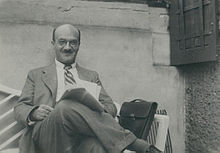Robert Weltsch
| Robert Weltsch | |
|---|---|

Robert Weltsch
|
|
| Born | 20 June 1891 Prague, Austria |
| Died |
22 December 1982 (aged 91) Jerusalem, Israel |
| Occupation | Journalist |
| Relatives | Felix Weltsch (cousin) |
Robert Weltsch (20 June 1891, Prague – 22 December 1982, Jerusalem) was a journalist, editor and prominent Zionist.
Robert Weltsch was born on 20 June 1891 in Prague when it was part of Austria-Hungary. The city had a strong Jewish community which was culturally German. Weltsch fought in World War I on the German side. His cousin, Felix Weltsch, was a good friend of Franz Kafka and Max Brod, and Robert was also lifelong friends with the latter; they shared a strong interest in idealistic Zionism.
From 1925 to 1933 Robert Weltsch was active in the Zionist organization Brit Shalom which advocated a binational solution in Palestine, with Jews and Arabs living together. In this cause he was befriended by Martin Buber and Albert Einstein, among others.
After fleeing to Palestine in 1938 (which at that time included all the territory of modern-day Israel, as well as the Gaza Strip and the West Bank), he continued asking for accommodation with the Arab population of Mandate Palestine. He was friendly with Chaim Weizmann, who would later become the first president of Israel.
Weltsch was editor of the (Jewish Review), a newspaper published twice a week in Berlin, Germany during the years the Nazis were gaining influence. The newspaper had a peak readership of 37,000. He edited and wrote for the Rundschau from 1919 through its demise under the Nazi regime in 1938 . His best-known contribution was a reaction to the April 1, 1933 Nazi-led boycott of Jewish shops, which was the first meaningful anti-Jewish action of the newly empowered Nazis. In his editorial Weltsch used the phrase, "Wear it with pride, the yellow badge." This was a call for strength and solidarity, and a lone voice in reaction to the Nazi boycott. It was not a reference to the forced-wearing of yellow armbands, which the Nazis didn't force on Jews until 1941, but rather a call for unity to a German-Jewish community that had until then thought of itself as comfortably assimilated into German life.
...
Wikipedia
